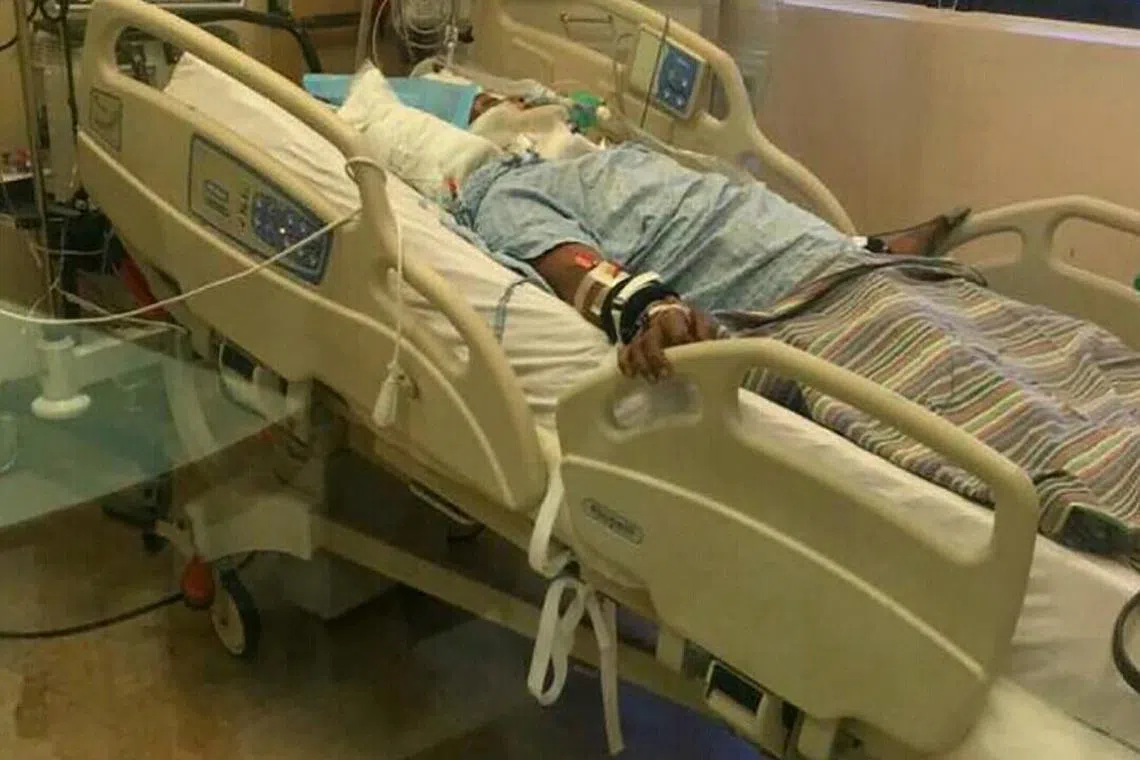Injured worker’s suit against employer: Judge throws out defence’s claim of ‘waiver’ signed
Sign up now: Get ST's newsletters delivered to your inbox

The worker, Mr Azmi Muda, suffered serious head injuries in a workplace accident on April 16, 2018.
PHOTO: HOH LAW CORPORATION
Follow topic:
SINGAPORE - A district judge, finding an employer liable for negligence in a lawsuit brought by an injured worker, threw out its defence that the worker had agreed to waive his right of action against the company.
The worker, Mr Azmi Muda, suffered serious head injuries in a workplace accident on April 16, 2018.
The court found that the $1,300 paid to Mr Azmi to sign the waiver presented to him in a visit by three company representatives did not serve as consideration in exchange for the agreement he signed with the company. It also ruled that the waiver had no contractual effect.
“The act of bringing along the equivalent of (Azmi’s) monthly salary in cash and paying it to him at the visit is not good consideration for him giving up his rights of action, and further, indemnifying the defendant for losses caused to the defendant,” said District Judge Jonathan Toh in oral grounds issued on Oct 31, 2022.
In law, to provide consideration is to offer something of value in exchange for a benefit.
The judge also ruled on the company’s claim that as part of the agreement, Mr Azmi would be allowed to continue to work once he was well, saying it was too uncertain a term to be enforceable as part of the agreement. “If this was nothing but a statement of intention that the (company) would continue to employ (Mr Azmi) when he is well, then it has no contractual effect, and cannot constitute good consideration,” the judge said.
Mr Azmi had sued employer Hiap Tong Crane & Transport over his injuries in the accident at the company’s premises in Soon Lee Road.
Then aged 35, the Malaysian technician suffered multiple skull vault and facial fractures when he was hit by a bent metal piece that flew out of a power-press machine that he was using to flatten it.
He was admitted to National University Hospital for treatment and stayed there for about two weeks. He sought damages for loss of earnings, medical costs, and pain and suffering, among other things.
Hiap Tong, through lawyer Riyach Hussain, denied the claims and argued that Mr Azmi’s lawsuit was precluded by the settlement agreement inked on May 4, 2018, between the parties.
The court was not convinced by this argument and learnt at the hearing that the company had subsequently accounted for the $1,300 paid to Mr Azmi as his salary.
The court also noted that the company hired the worker before his work permit application was made.
The judge called out the company’s false internal investigation report that was meant to “cure” its failure to file its permit application in time. He noted that the report implied Mr Azmi had been interviewed for the job on April 12, 2018, and had been instructed to turn up for work on April 16. This was the date of the accident, as well as of the company making an application for the Manpower Ministry’s in-principle approval for a work permit.
But the judge found that Mr Azmi had his job interview on April 11 and started work on April 12. “This false internal investigation report appears to be created to cure the defendant’s breach of failing to make a timely application for the plaintiff’s work permit, and employing him to work before he obtained the work permit,” he said.
The judge added that the company “then brazenly relied on it to allege that it was innocent of the plaintiff’s accident”.
He apportioned 15 per cent of the blame for the accident to Mr Azmi.
Mr Azmi’s lawyer, Mr N. Srinivasan from Hoh Law Corporation, said a separate hearing will be held to assess the damages payable to Mr Azmi by the company.
The State Courts assess damages up to a maximum of $250,000.


